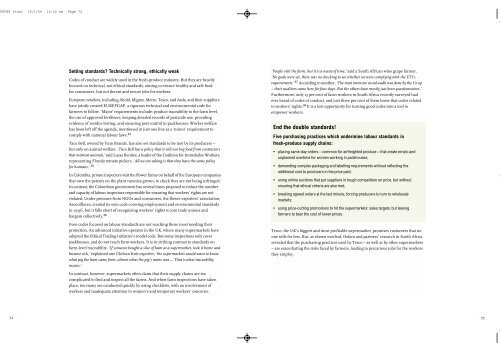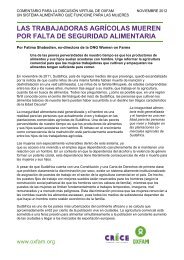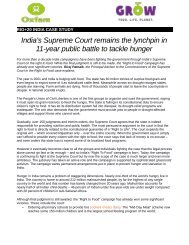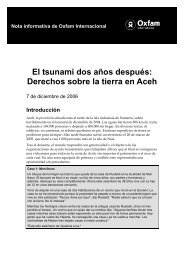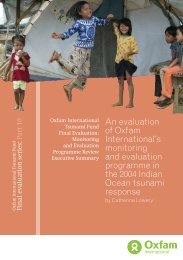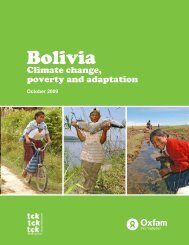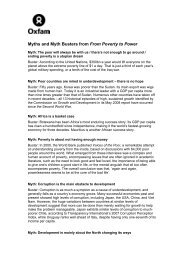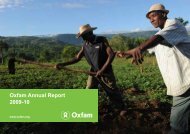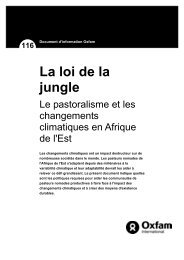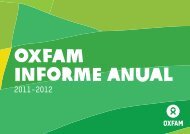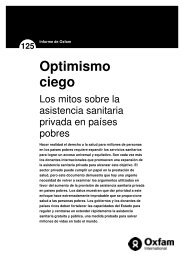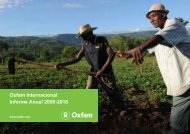EPORT final 19/1/04 10:20 am Page 70Exporting flowers is a sophisticated business in Colombia, but it is conducted onincredibly informal terms. ‘Years ago when I’d get an order by phone from the States,I’d say, first you send me the money, then I’ll send the flowers,’ explained one producer.‘Today, I have to send the flowers first and they pay 60 days later … If I ask for a letter of credit,the buyer just says, oh let’s not worry about that – there are plenty of others who will send meflowers without one.’ 23Farmers carry the risk of volatile prices too. The volume of fruit to be shipped to thesupermarket is agreed in a programme, but often the price is not. Supermarketsfix the margins they want and leave suppliers and farmers to bear any price fluctuations.‘The supermarkets are looking for a 30 per cent margin and say they want to sell grapes at99 pence (US$1.70),’ explained one South African grape farmer. ‘So they tell the importerthat he must underwrite the deal: if he can’t supply them with grapes at 66 pence (US$1.13)for the season, he must write them a cheque for the difference.’ 24Even though exporters and importers stand in the middle, they usually operate asagents on a commission, leaving the farmer with the price risk. A Chilean grape exporterexplained, ‘I try to get the best profit for their fruit … I deduct eight per cent for my fees,and I also deduct costs for materials and transport services – and what’s left is for them.’ 25That means farmers carry the cost if the fruit is rejected on arrival, if supermarketbuyers find a cheaper source, or if the buyers run low-price promotions to capturemarket share from other supermarkets. ‘I talked to my financial manager the other day,’said one apple farmer in South Africa, ‘and he said, “When you deliver your fruit,who do you invoice?” I said no one and that I wait for the price to be told to me.He said, “You’re not farming, you’re gambling.”’ 26Commanding controlProduct standards, such as those set by the European Union, can be highly specific,raising fertiliser costs and reducing yields. ‘Now they are telling us that the size of a Fujiapple is ideally 65mm, not 63mm,’ explained a South African apple farmer, ‘so when youare thinning you have to tell the workers to cut more deeply … There is more skill involved,but it also takes longer and there is more labour.’ 27 At the packhouse, individualsupermarkets – especially in the UK – require the fruit to be packed using their ownbags, crates, and sizes, increasing the complexity of the work. ‘The worst thing for us is theadditional requirements that retailers give us,’ said a South African packhouse manager.‘Now they want the fruit packed in a plastic tray, and that becomes expensive … they wantanother kind of pallet, a chipboard pallet. Those things cost us.’ 28Delivery schedules for fresh produce are extremely tight. Cut flowers and baby vegetablesare airfreighted from Kenya and Zambia to the UK, with supermarkets placing theirorders for produce to be sent the same day. For the supermarkets, it means tight controlover well-stocked shelves, but for women workers, same-day orders mean long andunforeseen overtime. Likewise, fruit transported by ship can spend two weeks at sea,but packhouses must still meet tight deadlines to ship orders in time. Add to thatincreasingly complex and supermarket-specific packaging, and the result for womenemployed in packhouses is long hours of working at high speed to deliver on time.Squeezing producers’ marginsWhile producers have faced rising costs of higher product and quality standards,the real prices paid to producers for many products have been stagnant or falling.Real export prices paid for South African apples have fallen 33 per cent since 1994. 29Florida tomato growers have seen the real price paid for their tomatoes fall by25 per cent since 1992 – unsurprising, given the growing consolidation among thoseproducers and given the increasing competition with Mexican imports, but USsupermarkets have raised the real price to consumers by 46 per cent at the same time. 30Supermarkets usually offer a marginally better price than wholesale markets –but they have other ways of clawing back costs. ‘Buyers are using fresh produce as astepping stone to something bigger,’ claimed one South African apple farmer.‘There’s pressure to build markets and wring out greater margins. The buyers are thereto build a reputation for themselves: it is the growth in market share.’ 31 Typically managinga product category for 12–18 months, produce buyers have to prove themselves fastand are judged, rewarded, and promoted on the overall profit they make – both bywidening profit margins and by imposing an array of fees and charges.Fees and charges are big business for supermarket buyers. A UK government enquiryinto supermarkets in 2000 found that at least one third of their UK-based suppliershad faced the following demands: to pay a fee just to be listed as a supplier; pay anotherfee to get shelf space; change orders at short notice; be paid later than agreed;contribute to nominated charities; give a ‘profit contribution’ to boost the supermarket’sown earnings; and pay for product promotions. 32 The government introduced a code ofpractice in 2002, regulating the relations between supermarkets and their suppliers,which is binding on the top five. But after one year in practice, many UK farmers andsuppliers were cynical about the code’s ability to make a difference to supermarketpractices, and remain reluctant to bring complaints forward for fear of being de-listed. 33‘Prices are negotiated withmy hands tied behind myback, with a blindfold.They really screw youto the floor.’South African wine producerselling to UK supermarkets7071
EPORT final 19/1/04 10:20 am Page 72Setting standards? Technically strong, ethically weakCodes of conduct are widely used in the fresh-produce industry. But they are heavilyfocused on technical, not ethical standards, aiming to ensure healthy and safe foodfor consumers, but not decent and secure jobs for workers.European retailers, including Ahold, Migros, Metro, Tesco, and Asda, and their suppliershave jointly created EUREPGAP, a rigorous technical and environmental code forfarmers to follow. ‘Major’ requirements include: product traceability to the farm level,the use of approved fertilisers, keeping detailed records of pesticide use, providingevidence of residue testing, and ensuring pest control in packhouses. Worker welfarehas been left off the agenda, mentioned in just one line as a ‘minor’ requirement tocomply with national labour laws. 34Taco Bell, owned by Yum Brands, has also set standards to be met by its producers –but only on animal welfare. ‘Taco Bell has a policy that it will not buy food from contractorsthat mistreat animals,’ said Lucas Benitez, a leader of the Coalition for Immokalee Workers,representing Florida tomato pickers. ‘All we are asking is that they have the same policyfor humans.’ 35In Colombia, private inspectors visit the flower farms on behalf of the European companiesthat own the patents on the plant varieties grown, to check they are not being infringed.In contrast, the Colombian government has several times proposed to reduce the numberand capacity of labour inspectors responsible for ensuring that workers’ rights are notviolated. Under pressure from NGOs and consumers, the flower exporters’ association,Asocolflores, created its own code covering employment and environmental standardsin 1996, but it falls short of recognising workers’ rights to join trade unions andbargain collectively. 36Even codes focused on labour standards are not reaching those most needing theirprotection. An advanced initiative operates in the UK, where many supermarkets haveadopted the Ethical <strong>Trading</strong> Initiative’s model code. But some inspections only coverpackhouses, and do not reach farm workers. It is in striking contrast to standards onfarm-level traceability. ‘If someone bought a slice of ham at a supermarket, took it home andbecame sick,’ explained one Chilean fruit exporter, ‘the supermarkets would want to knowwhat pig the ham came from, almost what the pig’s name was … That is what traceabilitymeans.’‘People visit the farm, but it is a waste of time,’ said a South African wine grape farmer.‘No goals were set, there was no checking to see whether we were complying with the ETI’srequirements.’ 37 According to another, ‘The most intensive social audit was done by the Co-op– their auditors came here for four days. But the others have mostly just been questionnaires.’Furthermore, only 13 per cent of farm workers in South Africa recently surveyed hadever heard of codes of conduct, and just three per cent of them knew that codes relatedto workers’ rights. 38 It is a lost opportunity for turning good codes into a tool toempower workers.End the double standards!Five purchasing practices which undermine labour standards infresh-produce supply chains:• placing same-day orders – common for airfreighted produce – that create erratic andunplanned overtime for women working in packhouses;• demanding complex packaging and labelling requirements without reflecting theadditional cost to producers in the price paid;• using online auctions that put suppliers in tough competition on price, but withoutensuring that ethical criteria are also met;• breaking agreed orders at the last minute, forcing producers to turn to wholesalemarkets;• using price-cutting promotions to hit the supermarkets’ sales targets, but leavingfarmers to bear the cost of lower prices.Tesco, the UK’s biggest and most profitable supermarket, promises customers that noone sells for less. But, as shown overleaf, <strong>Oxfam</strong> and partners’ research in South Africarevealed that the purchasing practices used by Tesco – as well as by other supermarkets– are exacerbating the risks faced by farmers, leading to precarious jobs for the workersthey employ.In contrast, however, supermarkets often claim that their supply chains are toocomplicated to find and inspect all the farms. And when farm inspections have takenplace, too many are conducted quickly by using checklists, with no involvement ofworkers and inadequate attention to women’s and temporary workers’ concerns.7273


